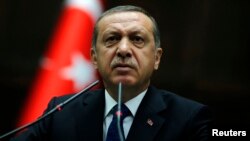Turkish President Recep Tayyip Erdogan will make a state visit Tuesday to Tehran. The Turkish president has indicated expanding trade relations will be a priority of his visit, with the prospect that international sanctions against Iran could soon be eased.
Erdogan will lead a large delegation of ministers in his visit to Tehran. He is scheduled to meet with Iranian President Hassan Rouhani and is expected to meet Iran’s spiritual leader, Ayatollah Ali Khamenei.
The visit comes just weeks after Erdogan threw his support behind the Saudi-led coalition attacking Houthi rebels in Yemen, which he suggested Iran is backing. Last Friday, Iranian Foreign Minister Mohammad Javad Zarif hit back, claiming Ankara’s policies had caused irreparable damage.
Former Turkish ambassador Murat Bilhan is vice chairman of the Turkish-Asian Center for Strategic Studies. He says the visit will not be easy.
"There has been some harsh criticism from the Iranian parliament so I do not think any convergence of opinion between these two countries would be achieved anytime soon. They have been rivals and they will continue to be rivals. But of course there is some kind of cooperation that will continue. But also of course some harsh words will be exchanged and so forth," said Bilhan.
Analysts say relations between the two powerful neighbors have always been a balance between rivalry and cooperation.
Erdogan is scheduled to attend the second meeting of the Turkey-Iran High Level Cooperation Council in which he is expected to press for an expansion in bilateral trade from the current $14 billion.
With the Turkish economy slowing after a decade of record expansion, Ankara is looking to develop markets.
With the prospects of international sanctions easing following the recent progress of talks in Lausanne, Switzerland on Iran’s nuclear energy program, Ankara sees potentially lucrative deals, says political consultant Atilla Yesilada of Global Source Partners.
"If sanctions will be lifted, they will buy more rice, more meat, more necessities from Turkey. There are other benefits as well. If the Iranian energy sector is rehabilitated, Turkey stands in a good position to sell investment goods like turbines and spare parts, etc. If they want to reach Mediterranean markets, EU markets, Turkey will be the transit country; but, these are all in theory - whether Iran wants to enrich Turkey is a much bigger question," said Yesilada.
Ankara has experience developing trade, despite diplomatic tensions.
Bilateral trade has increased with Israel after years of minimal diplomatic contact, and with Russia, which backs a rival side in the Syria war.
Analyst Yesilada warns Tehran may charge a heavy price for a part of any potential trade bonanza.
"Erdogan is going to Tehran to propose something like the Turkey-Russian relationship, which is economically working well, despite our differences of opinion in Syria. I do not think Iran is going to accept this two-track relationship and will force Turkey to make a choice between being in the Iranian axis and receiving the least of economic favors," he said.
With Erdogan strongly identifying with Sunni groups across the region, analysts say joining the Iranian axis is likely to be too high a price for Ankara to pay, whatever economic riches Tehran offers.
Despite Odds, Turkey to Expand Trade With Iran
- By Dorian Jones

ISTANBUL —



